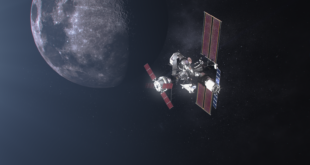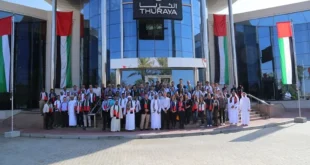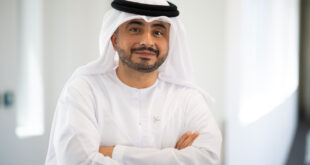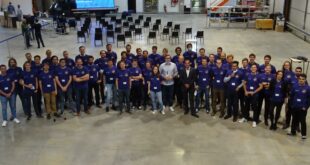Dubai is clearly leading global innovation. The city has recently played host to the High Level Forum, the World Government Summit and the World Economic Forum providing examples of Dubai’s forward thinking and ambitious attitude. The UAE is fast becoming a hub for space and the government fully recognises the role that space and off-planet habitation will play in our futures. One of the initiatives that has been borne out of this ambition is the Dubai Future Foundation, which shapes the future of the strategic sectors in cooperation with the government and private industry – and one of their principal areas of focus is space. Torsten Kriening was lucky enough to spend some time with Dr. Noah Raford, Chief Operating Officer and Futurist-in-Chief of the Dubai Future Foundation.
Noah, please tell us about the Dubai Future Foundation. What is the purpose and the motivation behind it?
 The Dubai Future Foundation is a wholly government-owned foundation based in the UAE. Our mission is to help facilitate positive transition into the 21st century in a way that benefits all of humanity. We focus almost exclusively on the areas that need rapid innovation in the 21st century, which most often are the most heavily regulated industries that have a strong public sector involvement. So this includes education, healthcare, scientific research, transportation, security – all of the sorts of things that make the difference between a successful society and a challenged one.
The Dubai Future Foundation is a wholly government-owned foundation based in the UAE. Our mission is to help facilitate positive transition into the 21st century in a way that benefits all of humanity. We focus almost exclusively on the areas that need rapid innovation in the 21st century, which most often are the most heavily regulated industries that have a strong public sector involvement. So this includes education, healthcare, scientific research, transportation, security – all of the sorts of things that make the difference between a successful society and a challenged one.
The real reason we were established was because it’s clear that most of the governance, business, infrastructure and mental models of the 20th century are struggling and, as a species, if we don’t rapidly invent new ways of doing things, we face a whole host of existential threats. This sounds dramatic, but the truth is that we face both extraordinary challenges and extraordinary opportunities. The next decade or two will be pivotal in our ability to actually realise those opportunities and handle these challenges.
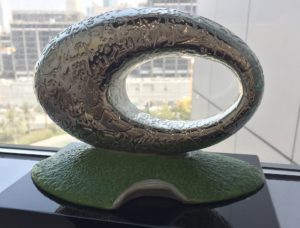
Our job is to help to create visions of the future that inspire people, then to work with partners to make these visions real. We do this by developing pilot projects and prototypes at the citywide scale in Dubai, in order to demonstrate how we can get to those better futures. We will take the successful pilot projects that come out of that and scale them up rapidly, legislate and make regulatory change, find financial investment and ultimately develop large scale, city-wide, new ways of doing things.
What role does space play in Dubai?
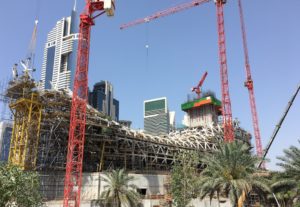
Space is an extremely important focus for us in Dubai and also in the UAE as a whole. We have gone from looking at space as a general diversification exercise to realising the truly inspirational potential that space holds for everyone in the world. It’s an extraordinary catalyst for collaboration that can evoke the highest aspirations of society to go to the stars. Space obviously has huge material benefits, but more importantly, it’s a symbol for going beyond the limitations of our existing possibilities. It is tremendously inspiring for young people and has become one of the most important missions in the UAE right now. There is everything from the Hope Mission to Mars to the construction of a building called Mars Science City that will become a test bed for the technologies necessary for living off-Earth and on a full city on Mars by 2117. There is also a national search for the first Emirati astronauts this year.
All of these are initiatives that really touches people. They inspire you to dream bigger and be a better person. Space has very rapidly become a very powerful focal point for a future that we all want to see.
You announced recently the MBR Space Settlement Challenge which is one of the initiatives that you drive. What is it? Can you elaborate a bit on that?
Yes. The Mohammed bin Rashid Space Settlement Challenge focuses on how we accelerate the process of humanity’s expansion and ultimate habitation in space. In December we launched a new think tank at the Foundation called the Centre for Accelerated Research. The reason ‘accelerated’ is used in the title is because the scientific funding model in use around the world is functionally broken. It takes 30-40% of any researcher’s time to write grant applications which is both time and labour-intensive and it can take anything from 6-18 months to hear back on grant applications as these are often reviewed by third parties somewhere far away who may not be as much of an expert or at the cutting edge of the relevant field.
Given the scale of the challenges we face, but also the scale of the opportunities we have ahead of us, we very strongly believe that this research process has to be accelerated. That’s why we are working with a partner company based in Estonia called Guaana that has developed a very interesting approach for a peer-to-peer scientific funding/review model. We used this model to fund seed grants for space habitation as the first major project for the Centre for Accelerated Research. We received over 160 applications for over 50 countries, and the quality of the submissions are just outstanding. The ultimate goal is be to take the whole research funding process down from months down to days, thereby “accelerating” scientific research in the areas that matter most.
The Space Settlement Challenge is a particularly exciting application for this approach because normally, if you’re going to spend three months writing a grant proposal worth a possible quarter of a million dollars or euros, you are going to concentrate on the things that you think are most likely to get funded. This introduces an inherent risk aversion and bias towards safety and fundability. This means that there is a whole scope of amazing ideas, pilot projects and experiments which could be conducted if it was easier to get funding and easier to create a dialogue around them.
The MBR Space Settlement Challenge was set up to fund those high-risk, high-reward ideas which would otherwise be un-fundable in the current scientific research process. It focuses on three areas. The first challenge is a fairly traditional approach around how our space settlement is going to work, be it lunar, orbital or Martian – everything from resource utilisation to life support systems to launch and delivery systems. The other two categories are perhaps more exciting in my opinion, because they look at the business models associated with the NewSpace economy. The second challenge asks how are we actually going to pay for this through cheaper launch vehicles and constructing a market around this new economy. The third challenge focuses on the social and legislative issues. We will need to find out what to do when a very ambitious person manages to build a launch vehicle, gets to the Moon and then claims it as their own. How do we address that? The three challenges are related to space habitation from an engineering, biological and physical perspective; economics, from a business modelling perspective; and a social perspective in terms of how an off-planet business will operate and what will governance then look like. The Challenge just closed and we’re really looking forward to seeing the funded projects announced very soon.
What happens once you have your winners?
We are aiming to have around 30 awards which will be seed grants of 15-20,000 euros each and we will hopefully bring everyone together for a conference and we plan to produce publications around it. However, what we really hope this accelerates is the input of ideas into the larger space programme in the UAE and the MBR Space Centre. Although the Dubai Future Foundation’s job is to put these risky experiments into action, there’s no guarantee it will work. However, if it does, we hope that the MBR Space Centre and the UAE Space Agency will be able to use it within their larger research agenda.
What are the potential ripple effects into other areas such as socio-economic development and AI – all of the things that Dubai is touching on at the moment?
I think it is all integrated. Any of the solutions or ideas which are likely to come through this application process are going to have to be tested somewhere. They must be developed somewhere, so this is one part of the larger innovation ecosystem which we have developed in the UAE. Our programme model is: if you have a product or an idea that is linked to one of the government’s key challenges, we’ll bring you to Dubai for nine weeks as part of the Dubai Future Accelerators. While here, you’ll work with the biggest customers and regulators to develop a business proposal that tests your approach. If your proposal is accepted, it will be funded, and we will figure out all the regulatory and legislative issues required to do the test project. If the test project is successful, we help you write the rules and regulations to scale that up.
Let’s widen our scope to the geopolitical dimension. So Dubai is a regional space hub like Singapore. What has Dubai to offer over Singapore?
The advantage that the UAE has to offer is that it is extremely fast-moving and offers extraordinary regulatory flexibility and it also has massive ambitions. There are few other places in the world right now where you are able to match up funding with flexible governance, the political ambition and the talent that is required to carry out generational transformation and experiments. Our fundamental philosophy is that we all need to be working towards building a better world and towards civilisational transition. Ultimately these challenges should bring together cities such as Dubai, Singapore, Paris, Berlin and Johannesburg and many other places. We believe very much in the spirit of cooperation. All we can do is bring what we have to the table which is speed and ambition and a desire to change the world.
What motivated you to work in the space industry?
I grew up reading technical studies on O’Neill’s orbital colonies and I was mesmerised by their ambition and, in particular, the paintings that JPL had commissioned. The vision of this new frontier was profoundly influential to me as a child and inspired me to get into architecture and city planning. It has been a long and winding road for me since architecture school but I am still passionate about the idea that, ultimately, our future lies in space. Multi-planet living is such an inspiring vision to work towards. Even though I left urban planning, I’ve always wanted to play a role in helping to facilitate these visions. I think we’d all agree that they’re needed now more than ever, which is why it is such an honour to be able to work in the UAE under such visionary leadership and play even the tiniest part in making them happen.
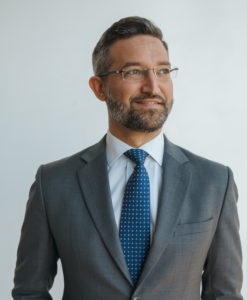
Dr. Noah Raford: Prior to his work in the UAE, Noah was a senior manager at the strategy consultancy Monitor / GBN, CEO and co-founder of the technology foresight company Futurescaper, North American Director of Space Syntax Limited, and the Senior Research Advisor to Prince’s Foundation for the Built Environment.
Noah completed his PhD at the Massachusetts Institute of Technology (MIT), his masters at the Bartlett School of Architecture, and his undergraduate degree at Brown University. He has served as a member World Economic Forum (WEF) Global Agenda Council on Artificial Intelligence and Robotics, a Senior Research Fellow at the London School of Economics, a fellow at the Bartlett School of Architecture, and as a member of the International Futures Forum.
He lives in Dubai, is married with two children and is a semi-retired techno DJ. He maintains an occasional podcast called NerdHouse(mixing deep techno with deep lectures and spoken word) and is currently working on his third book, “Pre-Legal Innovation: How to Build the Future Where it Matters the Most”.
SpaceWatch.Global thanks Dr. Noah Raford of Dubai Future Foundation for the interview.


